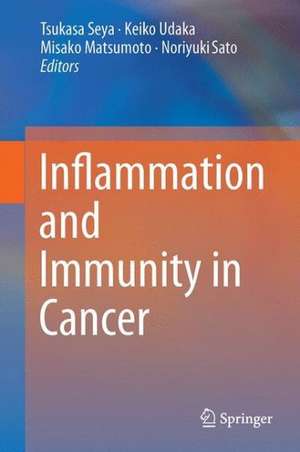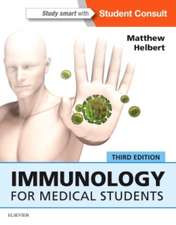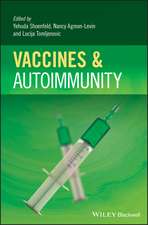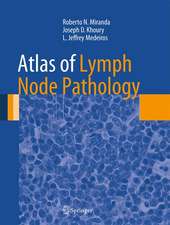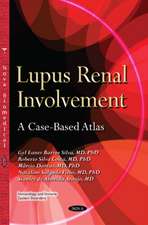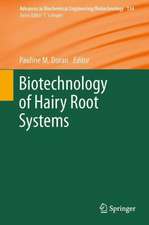Inflammation and Immunity in Cancer
Editat de Tsukasa Seya, Misako Matsumoto, Keiko Udaka, Noriyuki Satoen Limba Engleză Hardback – 8 apr 2015
With the contributions of leading scientists actively involved in the field of antitumor immunity study, this book encourages readers to understand the mechanism of general cancers based on inflammation and will facilitate prevention and the development of therapeutics for cancer.
| Toate formatele și edițiile | Preț | Express |
|---|---|---|
| Paperback (1) | 664.32 lei 39-44 zile | |
| Springer – 9 oct 2016 | 664.32 lei 39-44 zile | |
| Hardback (1) | 721.96 lei 6-8 săpt. | |
| Springer – 8 apr 2015 | 721.96 lei 6-8 săpt. |
Preț: 721.96 lei
Preț vechi: 759.96 lei
-5% Nou
Puncte Express: 1083
Preț estimativ în valută:
138.15€ • 144.53$ • 114.76£
138.15€ • 144.53$ • 114.76£
Carte tipărită la comandă
Livrare economică 03-17 aprilie
Preluare comenzi: 021 569.72.76
Specificații
ISBN-13: 9784431553267
ISBN-10: 4431553266
Pagini: 268
Ilustrații: XI, 268 p. 72 illus., 60 illus. in color.
Dimensiuni: 155 x 235 x 17 mm
Greutate: 0.57 kg
Ediția:2015
Editura: Springer
Colecția Springer
Locul publicării:Tokyo, Japan
ISBN-10: 4431553266
Pagini: 268
Ilustrații: XI, 268 p. 72 illus., 60 illus. in color.
Dimensiuni: 155 x 235 x 17 mm
Greutate: 0.57 kg
Ediția:2015
Editura: Springer
Colecția Springer
Locul publicării:Tokyo, Japan
Public țintă
ResearchCuprins
Preface.- 1 Role of bone marrow-derived CCR1+ cells in colon cancer invasion and metastasis.- 2 PGE2-associated inflammation and gastrointestinal tumorigenesis.- 3 Regulation of tumor-associated myeloid cells by innate immune signaling.- 4 The role of PIKfyve in TLR-mediated inflammation and immune responses.- 5 Emerging roles of an innate immune regulator TAPE in the Toll-like receptor and RIG-I-like receptor pathways.- 6 Anchorage-dependent multicellular aggregate formation induces CD44 high cancer stem cell-like phenotypes in adult T-cell leukemia/lymphoma cells.- 7 Tumor-associated molecular patterns: its implication in tumoricidal inflammation.- 8 Host factors involved in the propagation and pathogenesis of hepatitis C virus.- 9 HCV-induced inflammation: The role of cross-talk between HCV-infected hepatocytes and stellate cells.- 10 Development of immunotherapy for hepatocellular carcinoma.- 11 Development of glypican-3-targeted cancer immunotherapy.- 12 The vesicular traffic system in plasmacytoid dendritic cells as a target for immune regulation.- 13 In vivo targeting of dendritic cells with artificial adjuvant vector cells (aAVC) as a novel cancer immunotherapy.- 14 Enhancement of efficacy of WT1 peptide cancer vaccine by co-administration with immunopotentiating agents: Lessons from mouse models.- 15 Regulation of antigen-presentation by dendritic cells and its application to cancer immunotherapy.- 16 A new mode of CTL induction secondary to alteration of pMHCI repertoire by antigen processing defects.- 17 Progress in clinical use of CCR4 antibody for regulatory T cell suppression.- 18 Adjuvant Immunotherapy for cancer: Basic research to clinical bench.- 19 Immunological regulation of human cancer stem cell/cancer-initiating cells (CSC/CIC).- 20 Overview on tumor immunology.-BM Epilogue.
Textul de pe ultima copertă
This book overviews cancer immunity from broad scientific fields, based on the concept that cancer is a sort of by-product of infection, inflammation, and host immune response. The innate and acquired arms of the immune system mainly participate in tumor immune surveillance, and their activation is critically modulated by the situation of the tumor microenvironment. Many types of immune cells join the formation of the microenvironment. In particular, macrophages and dendritic cells enter the tumor mass to be main players in the inflammatory milieu of tumors. After introducing these topics, the book discusses immunotherapy for cancer patients as an outgrowth of this concept of infection and inflammation.
With the contributions of leading scientists actively involved in the field of antitumor immunity study, this book encourages readers to understand the mechanism of general cancers based on inflammation and will facilitate prevention and the development of therapeutics for cancer.
With the contributions of leading scientists actively involved in the field of antitumor immunity study, this book encourages readers to understand the mechanism of general cancers based on inflammation and will facilitate prevention and the development of therapeutics for cancer.
Caracteristici
Facilitates a scientific understanding of up-to-date knowledge on cancer in immunotherapy Includes information on recent Japanese studies of inflammation, immunity, and cancer Is written by scientists directly involved in the field
